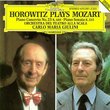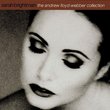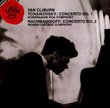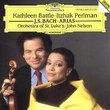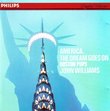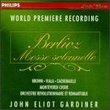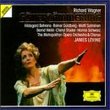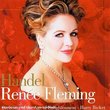| All Artists: Johann Sebastian Bach, Neville Marriner, Christopher Hogwood, Sir Andrew Davis, Nicholas Kraemer, Academy of St. Martin-in-the-Fields Title: Bach: The Art of Fugue / Musical Offering Members Wishing: 0 Total Copies: 0 Label: Philips Release Date: 10/17/1994 Genre: Classical Styles: Chamber Music, Forms & Genres, Improvisation, Historical Periods, Baroque (c.1600-1750) Number of Discs: 2 SwapaCD Credits: 2 UPC: 028944255621 |
Search - Johann Sebastian Bach, Neville Marriner, Christopher Hogwood :: Bach: The Art of Fugue / Musical Offering
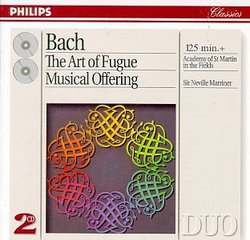 | Johann Sebastian Bach, Neville Marriner, Christopher Hogwood Bach: The Art of Fugue / Musical Offering Genre: Classical
There are many apocryphal stories in the classical-music world, but the one in which Frederick the Great challenged Bach to improvise a six-part fugue on a theme of the king's own invention is true, and The Musical Offerin... more » |
Larger Image |
CD DetailsSynopsis
Amazon.com essential recording There are many apocryphal stories in the classical-music world, but the one in which Frederick the Great challenged Bach to improvise a six-part fugue on a theme of the king's own invention is true, and The Musical Offering was, after a period of further reflection, the result. As with all the works of Bach's later years, the work is both great art and a "teaching piece," which shows everything that he thought could be done with the king's theme. The Trio Sonata based on the theme is the only major piece of chamber music from Bach's last decades in Leipzig, and that makes the work and essential cornerstone of any Bach collection. This performance, led by Neville Marriner, is both polished and lively, and very well recorded. At a "twofer" price, coupled with The Art of Fugue, it's the preferred version of the work on modern instruments. --David Hurwitz Similarly Requested CDs
|
CD ReviewsAn early masterpiece of the baroque revival M. Friedman | New York Area | 01/18/2000 (4 out of 5 stars) "It was the music on this disc -- originally available as separate boxed sets of vinyl records -- along with ASMF's Brandenburgs that really sparked my interest in baroque music in general, and Bach in particular. Though, 30 years later, the performance sounds a little dark, slow and dense to ears accustomed to airier historically-informed performances, it nevertheless has a richness and warmth that you simply won't hear on any other recording of these two works. This is absolute music, composed without any specific instrument in mind. The Offereing and the Art of Fugue have been equally successfully performed on the organ, harpsichord, piano, and by string ensemble. The ASMF succeeds in presenting them in ALL of these contexts, except the piano. The performance is first-rate, if a little reserved." LIKE A TEXTBOOK --VERY INFORMED-NOT BAD, BUT A LITTLE DRY Dorian Lopez | North Bergen, NJ USA | 05/29/2003 (3 out of 5 stars) "This cd is best for those of us who are unfamiliar with Bach's music and want to get to know these two works and buy an affordable cd at the same time. As a general introduction it is great and very educational--the art of fugue is played on various instruments to drive home the fact that the music was never scored for specific instruments. Each contrapunctus is given a decent and fair showing.Marriner however seems to be most comfortable when he is conducting lighter, airier stuff like Mozart divertimentos (some of the best mozart around is conducted my marriner in my opinion) Bach is a little above him i think.You can tell that he has deep respect for this music by the way he handles it--but i think he has trouble finding the soul or emotion of this music. Put another way he demonstrates masterfully the intellectual side of Bach, but fails at capturing the emotion and feeling of Bach. And dont tell me that there is no emotion to Bach's music--because i know better having heard some of his other pieces. To be fair though it should be said that The Art of Fugue and to some extent the Musical Offering are two of Bach's most abstract and "conceptual" works so it is no wonder that one might have trouble capturing all its dimensions on cd. I have difficulty sitting through this cd (although i have done it several times) at times the performance comes off as being a little dry and rote--almost as if one was playing an exercise or an etude rather than a work proper. It is best in small pieces. The fugal nature of the piece can at times make one think one is hearing the same thing over and over due to the slower tempo and conducting style of Marriner. In reality however there are many different things going on in each fugue despite the fact that they are all based on one theme. Close listening to the cd helps to develop a sensitive ear as you try try to distinguish what is going on in each fugue that sets it apart from the others (analysis). As a final word, this cd is not bad-it s a good showing, but its definitely not the best perf either.In my opinion-this cd is best heard in small chunks. Its great if you want an introduction to this work, its great if you want to save money. Its great if you like your bach simple-- except for two harpsichords it doesnt use period instruments--but it does use period performance (no vibrato, small ensemble) Its also great if you like to "dissect" your Bach as you hear it and see the analytical side to this music. If however you would like to hear the emotional side to these very intellectual and somewhat abstract pieces try the Munchinger. Also do not miss the Stardust Quartet interpretation on recorders--it sounds as if it were a totally different piece--very airy and beautiful rather than heavy and concrete. In general i would say if you dont know these two pieces by Bach start with this and once you feel comfortable and familiar with the piece check out some of the other interpretations and see how they differ and which you like best." Only the tape quality keeps this from a '5' Mark Lee | Woodruff, UT USA | 09/21/2001 (4 out of 5 stars) "This CD set comes from some tapes recorded during the '70s, and the audiophile will quickly hear this. In spite of this hiccup, the depth of the performances are striking.In his last years, J.S. Bach wrote much of his music for the sheer joy of creating mathematically delightful pieces, hence the endless variations and inversions of the themes from "Art of the Fugue" and "Musical Offering." Some evidence suggests that J.S.B. didn't care too much whether or not the music was, in fact, performed. I think he would be struck by this performance, especially, of the 6-part ricercar - one of the most complex and repeatedly listenable compositions ever put to paper by man.This is not necessarily a collection of music that bears constant listening to from start to finish as if it were a number of movements of a larger piece. Pick and chose your diamonds from the drawer, and leave a few for another day."
|

 Track Listings (18) - Disc #1
Track Listings (18) - Disc #1